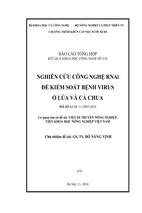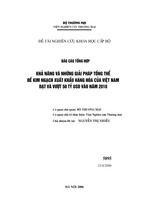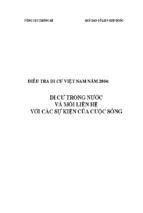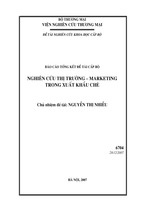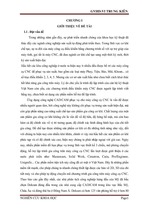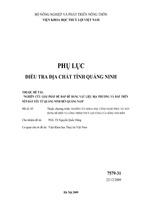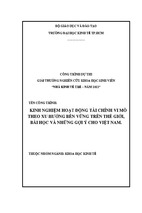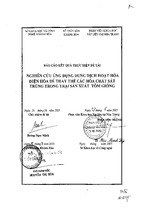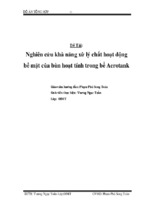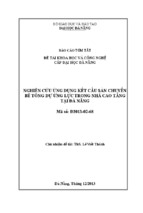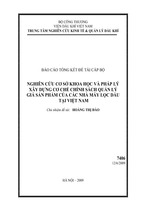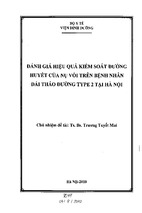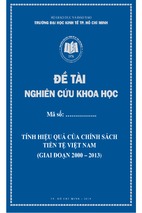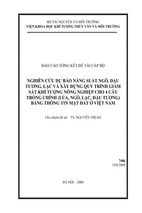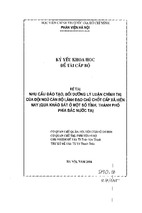THE ROLE OF CORPORATE SOCIAL RESPONSIBILITY
IN BUSINESS PRACTICES AND KEY STAKEHOLDERS
A CASR STUDY OF LG ELECTRONICS
BY
NHAM MINH THUONG
Graduation Project Submitted to the Department of Business Studies, HELP
University College, in Partial Fulfillment of the Requirements for the Degree of
Bachelor of Business (Accounting) Hons.
OCTOBER 2011
1
October 2011
Declaration of Originality and Word Count
DECLARATION
I hereby declare that this graduation project is based on my original work except for
quotations and citations which have been duly acknowledge. I also declare that it has
not been previously or concurrently submitted for any other courses/ degree at Help
University College or other institutions.
Word account: 10,688 words.
NHAM MINH THUONG
Date: 28/10/2011
2
ACKNOLEDGEMENT
First of all, I would like to express my sincere appreciation to my supervisor, Dr. Le
Van Lien, International School, Vietnam National University Hanoi who has guided
me throughout this graduation project. By his constant guidance, insightful
suggestions, I can complete my project. Furthermore, I would like to express my
appreciation to Ms. Sumathi, Help University College, who initiated the project and
give so much instruction and support during this process.
Next, I would like to express my appreciation to all managers and staff of LG
Electronics Vietnam helped me to complete my graduation. By their help to take into
my survey, I can have information to support my project. They play a vital role in
completing my graduation project.
Lastly, I want to give my pleasure to my family, who always support me in the period
doing my project.
NHAM MINH THUONG
3
ABSTRACT
THE ROLE OF CORPORATE SOCIAL RESPONSIBILITY
IN BUSINESS PRACTICES AND KEY STAKEHOLDERS
A CASR STUDY OF LG ELECTRONICS
By
NHAM MINH THUONG
OCTOBER 2011
Supervisor: Dr. Le Van Lien
Nowadays, CSR becomes more and more important issue in over world and also in
Vietnam. CSR plays a vital role in business practices and key stakeholders. So, to
develop sustainably, CSR is the key term for this development. This paper aims to
discover the how the CSR affect to business practices and key stakeholders in
Vietnam. However, the researcher gives a case study of LG Electronics to analyze.
Because of LG Electronics is multinational organization and from Korea. It is difficult
for researcher to analyze, so the researcher focuses on LG Electronics Vietnam. The
main aim of this research is to find the role of CSR in the business practices and key
stakeholders by examining the case study of LG Electronics Vietnam. The survey will
be given to the LG”s staffs to find out the level of awareness and the implementation
of CSR in LG Electronics Vietnam.
4
TABLE OF CONTENTS
DECLARARION OF ORIGINALITY AND WORD COUNT …………………...2
ACKNOWLEDGEMENT ………………………………………………………….. 3
ABSTRACT ..................................................................................................................4
TABLE OF CONTENTS …………………………………………………………….5
LIST OF FIGURES AND TABLES ……………………………………………...... 8
LIST OF ABBREVIATIONS ………………………………………………….........9
CHAPTER 1: INTRODUCTION ………………………………………………….10
1.1. CSR in the world ………………………………………………………………...11
1.2. CSR in Vietnam …………………………………………………………………12
1.3. CSR in multinational companies in VN …………………………………………13
1.4. CSR practices and challenges …………………………………………………...14
1.5. Objectives of research …………………………………………………………...15
1.5.1. Objectives of research …………………………………………………………...15
1.5.2. Sphere of research ……………………………………………………………….15
1.5.3. Research method ………………………………………………………………...16
CHAPTER 2: LITERATURE REVIEW ………………………………………….17
2.1. Definition of CSR & benefits from CSR …………………………………………18
2.2. Carroll 1979-1991 conceptualization ……………………………………………..19
2.3. The concepts related to CSR ……………………………………………………...21
2.3.1. Stakeholder theory ………………………………………………………………21
2.3.2. Utilitarianism in an organization ………………………………………………..22
2.3.3. CSR reporting …………………………………………………………………..23
2.3.4. Triple bottom line ………………………………………………………………24
5
2.3.5. Sustainable development ……………………………………………………….25
CHAPTER 3: RESEARCH METHODOLOGY…………………………………..27
3.1. Research objectives ………………………………………………………………28
3.2. Problem statement ………………………………………………………………..28
3.3. Research methodology ……………………………………………………………28
3.3.1. Data source………………………………………………………………………28
3.3.1.1. Primary data …………………………………………………………………..29
3.3.1.2. Secondary data ………………………………………………………………..29
3.4. Research method ………………………………………………………………….29
3.5. Research tool ……………………………………………………………………...29
3.6. Sampling …………………………………………………………………………..30
3.6.1. Sampling population …………………………………………………………….30
3.6.2. Sampling frame ………………………………………………………………....30
3.6.3. Sampling size ……………………………………………………………………30
3.7. Limitations ………………………………………………………………………...31
3.8. Hypothesis statement ……………………………………………………………...31
CHAPTER 4: ANALYSIS …………………………………………………………..34
4.1. Collection of questionnaires ………………………………………………………35
4.2. Description of result ………………………………………………………………35
4.2.1. Age ……………………………………………………………………………...35
4.2.2. Gender …………………………………………………………………………. 36
4.3. Management ………………………………………………………………………36
4.3.1. Level of awareness ……………………………………………………………...37
4.3.2. The implementation of CSR …………………………………………………….40
4.4. Employees ………………………………………………………………………...48
6
4.4.1. Level of awareness ……………………………………………………………...49
4.4.2. The implementation of CSR ……………………………………………………50
4.5. Customers …………………………………………………………………………51
4.5.1. Level of awareness ……………………………………………………………...52
CHAPTER 5: CONCLUSION ……………………………………………………...54
5.1. Conclusion ………………………………………………………………………...55
5.2. Recommendation ………………………………………………………………….56
5.3. Limitations of study ……………………………………………………………….57
5.4. Suggestion for future researchers …………………………………………………57
REFERENCES ………………………………………………………………………58
APPENDICES ………………………………………………………………………..60
APPENDIX A: QUESTIONAIRES ………………………………………………...60
7
LISTS OF FIGURES AND TABLES
Figure2.1. pyramid mode of CSR (Archie. B. Carroll. 1979)
Figure2.2. the relationship between the firm and stakeholders
Figure2.3. triple bottom line
Figure4.1. distribution of responses from management survey
Figure4.2. LG Electronics‟ CSR Governance
Figure4.3. take-back and recycling amounts in Asia
Figure4.4. work-life balance
Figure4.5. distribution of responses from employee‟s survey
Figure4.6. distribution of responses from customers‟ survey
Table1 Age
Table 2 Gender
8
LIST OF ABBREVIATIONS
CSR
Corporate social responsibility
VND
Vietnam Dong
WTO
World trade organization
TBL
Triple bottom line
VBLI
Vietnam Business Link Initiative
VCCI
Vietnam Chamber of Commerce &Industry
9
CHAPTER 1: INTRODUCTION
1.1.
CSR in the world
1.2.
CSR in Vietnam
1.3.
CSR in multinational companies in Vietnam
1.4.
CSR practices & challenges
1.5.
Objectives & Sphere research
1.5.1
Objective of research
1.5.2
Sphere of research
1.5.3
Research method
10
CHAPTER1: INTRODUCTION
1.1 CSR in the world
Nowadays, CSR is no longer an option; it becomes one part of the normal business
obligations to all stakeholders. The issue of CSR is a topical one in every country
around the world today, not because CSR is a soft issue but because it is an issue that
touches different aspects which are important & of concern to us all. The issue is
global warming, corporate and individual philanthropy, CO2 emissions reduction, and
so on. However, the stakeholders are now sophisticated, educated, well informed and
they know what is best for them. They will not hesitate to take whatever actions are
deemed responsible and legitimate to request corporate entities to produce what is
needed. For example, in UK, stakeholders‟ increasing requests for information from
companies on their CSR activities appear to be the main driving force behind the
issuing of CSR reports by UK companies. These companies have realized that
providing information on their CSR activities is a good method of achieving positive
public relations. As an engine for social progress, CSR helps companies live up to
their responsibilities as global citizens and local neighbors in a fast changing world.
And acting in a socially responsible manner is more than just an ethical duty for
company. For instance, Swedish Bank (SEB) has a department responsible for
corporate sustainability including environment and CSR. That department delivers on
a comprehensive range of commitments such as a target to reduce carbon emissions by
45% by 2015. Chief Executive Officer, Annika Falkengren explains: “We want to be
the trusted partner for customers with aspirations and know that we must meet
11
increasingly higher expectations on responsible corporate behavior if we want to
remain successful”. It is just because of SEB‟s understanding of how its role in society
must develop, that it requires a team to focus on driving that change throughout the
business. Or IBM, over the 100 years existence, they developed and refined a
thoughtful and comprehensive approach to corporate citizenship by corporate service
programs on specific societal issues, including the environment, community economic
development, education, health, literacy, language and culture.
1.2. CSR in Vietnam
Nowadays, Vietnam is one of the new markets for many companies from over the
world. With the advantages such as human labor is cheap plus the growth of economic
is high, Vietnam attracts more foreign investment enterprises. It can be said that, when
many foreign companies came to Vietnam, CSR concept is used to popular in
Vietnam. Some businesses have adopted CSR policies and rules of ethics, but they are
often based on approaches from the top suppliers to apply moral rules upon request
from customers rather than developing their own CSR to expand market share.
Moreover, understanding the concept of CSR in Vietnam is still not exactly, therefore
this makes the application of CSR in Vietnam as passive. According to
recommendations from a study of CSR in Vietnam has urged the Government to
provide businesses and stakeholders information about the rules of CSR in order to
raise awareness and capacity, the Government need to set up a support fund for the
application of CSR. Research by the World Bank at the level of enterprises in Vietnam
have identified a positive trend in organizations have adopted CSR, such as improving
the image and reputation of the business, working conditions better productivity and
quality improved. In particular, firms have adopted CSR in Vietnam, said the
12
improved method has helped them improve their product quality, reduce product
defects and improving the ability to meet the requirements of customers the stability
related to delivery deadlines. There are two companies that are the examples in
implementing successful CSR, are Hung Cuong trading limited company and Unilever
Vietnam. Since 1998, Hung Cuong has seriously programs to support the employees‟
living conditions. Employees in the company have annually health checking, and
distributed two sets of clothing and other items as shoes, gloves, masks, hats for
working. In the business of production and processing tea for export, the leading factor
that companies must comply with the performance standards in quality management
system ISO 9001: 2000 and the food safety system HACCP. While Unilever Vietnam,
multinational company, always work with the mission “develop through people”, the
company promise to take care of the interest of the employees and have policies to
support their working. During operations in Vietnam, company has policies of human
resource development, Unilever come up with several humanitarian and development
community. Unilever spent a big budget for humanitarian commitments, mainly in the
areas of health, education, poverty reduction and disaster prevention. It can be said
that these are the two leading in implementing successful CSR in Vietnam. It will
build the foundation for understanding about CSR in Vietnam.
1.3. CSR in multinational companies in Vietnam
When Vietnam enters the WTO, it makes a big opportunity for many companies over
the world come to Vietnam. Now, there are many multinational companies in
Vietnams, such as Samsung, LG Electronics, Nestle‟, Nokia, Toyota, and so on.
Because they are multinational organizations, the managers might to have knowledge
about CSR. Therefore, the company has the CSR policies. From that, the concept of
13
CSR is becoming popular in business in Vietnam, and it has to be needed on the future
for any companies in Vietnam. We can see many multinational companies
implemented CSR very successful, and they are trying to take into the many social
activities as much as possible. For example, we talked above about Unilever. Unilever
come up with several humanitarian and development community. Unilever spent a big
budget for humanitarian commitments, mainly in the areas of health, education,
poverty reduction and disaster prevention. Or LG Electronics paid attention to
donation and give scholarship for student that have poor condition, or becomes a tenyear donor for the game show to finding the excellent student on TV called “Olympia
way to the top”. So that, many good student have opportunities to go abroad for
studying. On the other hand, many companies have not adopted and implement CSR.
The famous example is Vedan, one company from Taiwan, polluted the water in Thi
Vai River in 10 years. These causes the serious consequences for people live near this
river. Level of pollution was 90% with the range of about 10km affected along the Thi
Vai River ( Dantri, 2009).
1.4. CSR practices and challenges
In Vietnam, the Government has to raise awareness of businesses and stakeholders on
CSR; CSR is regarded as an important content in the agenda of sustainable
development. The international development organizations in Vietnam have so much
effort in promoting and implementing CSR. The programs and projects related to CSR
focused on some important issues of CSR depend on the project‟s objectives,
resources and experience available. The Vietnam Business Links Initiative (VBLI),
launched under the auspices of the Vietnam Chamber of Commerce and Industry
(VCCI), cooperates with international organizations, offers consulting services and
14
training programs that will improve the labor environment, raise the CSR awareness
among such enterprises.
However, in Vietnam, there are still a lot of difficulties in applying the CSR. Firstly,
there is not enough law and regulation to enforce companies to complete their duties
to the society. Secondly, the manager and employees still lack of knowledge about
CSR. This is the most difficult obstacle for any companies in process to implement
CSR.
1.5. Objectives and sphere research
1.5.1. Objective of research
There are some main objectives of research:
-
Provide framework about CSR, including definitions, concepts related to CSR.
- To find the level of awareness of CSR in LG Electronics Vietnam.
- To present the benefits that CSR can bring to company, and key stakeholders.
- To show the implementation of CSR in LG Electronics Vietnam.
1.5.2. Sphere of research
- Research place: LG Electronics Vietnam.
- Objective of research: the role of CSR in business and key practices.
- Time duration of conducting the research: from August 1, 2011 to October 9,
2011
1.5.3. Research method
15
In order to do this research, the researcher used survey method to collect information
from managers, employees, and customers. The questionnaires are given to managers,
employees of LG Electronics and customers in Hanoi.
16
CHAPTER 2: LITERATURE REVIEW
2.1. Definition of CSR & benefits from CSR
2.2. Carroll 1979-1991 conceptualization
2.3. The concepts related to CSR
2.3.1. Stakeholder theory
2.3.2. Utilitarianism in an organization
2.3.3. CSR reporting
2.3.4. Triple bottom line
2.3.5. Sustainable development
17
CHAPTER 2: LITERATURE REVIEW
2.1. Definition of CSR and benefits from CSR
In the fact, to define the content of CSR we have various ways to do that. The World
Business Council for Sustainable Development in its publication “Making Good
Business Sense” by Lord Holme and Richard Watts used the following definition.
“Corporate Social Responsibility is the continuing commitment by business to behave
ethically and contribute to economic development while improving the quality of life
of the workforce and their families as well as of the local community and society at
large”. Or the CSR is defined by Business for Social Responsibility “Operating a
business in a manner that meets or exceeds the ethical, legal, commercial and public
expectations that society has of business. CSR is seen by leadership companies as
more than a collection of discrete practices or occasional gestures, or initiatives
motivated by marketing, public relations, or other business benefits. Rather, it is
viewed as a comprehensive set of policies, practices, and programs that are integrated
throughout business operations, and decision-making processes that are supported and
rewarded by top management.” However, according to a new study, CSR initiatives do
bring one very important benefit to companies- a supervisor ability to raise money for
strategic investments and initiatives. Beiting Chen and George Serafeim of Harvard
Business School, with Ionannis of London Business School, analyzed the CSR scores
of 2,439 publicly traded companies, as provided by Asset 4, a unit of Thomson
Reuters. They then compared those scores to a five- point index designed to measure
the companies‟ access to capital, looking at every year from 2002 to 2009. They found
that companies with high CSR scores have much easier time raising money than their
18
less socially- responsible competitors. This implies, the researchers say, that firms
with great CSR scores can access capital at better interest rates than other firms, or
that they can access more money than other firms, but at the same interest rates. It
could be that a particularly high CSR score kicks of a “virtuous cycle”: Companies
with great CSR score are better able to raise money for their strategic investments and
initiatives, which in turn improve their stock market returns-and that makes it easier
for them to raise money. CSR is generally divided into three types of initiatives:
environmental responsibility, social responsibility, and good corporate governance.
And the result is found that the factors was most responsible for improved ability to
raise money are environmental and social responsibility, and corporate governance
was much less important because a company‟s corporate governance may be more
influenced by the regulations and expectations in its home country than by any
independent initiative.
2.2. Carroll 1979-1991 conceptualization
According to Carroll (1983), “CSR involves the conduct of a business so that it is
economically profitable, law abiding, ethical and socially supportive. To be socially
responsible then means that profitability and obedience to the law are foremost
conditions when discussing the firm‟s ethics and the extent to which it supports the
society in which it exists with contributions of money, time and talent”. Carroll
introduced CSR into four parts: economic responsibility, legal responsibility, ethical
responsibility, and philanthropic.
19
Figure 2.1: Pyramid model of CSR (Archie. BCarroll.1979)
Firstly, he concerned about economic responsibilities which business organizations was
the basic economic unit in our society, and its principal role was to produce goods and
services that consumers needed and wanted and to make an acceptable profit in the
process.
Secondly, legal responsibilities reflect a view of “codified ethics” in the sense that they
embody basic notions of fair operations as established by lawmakers. Business is
expected to comply with the laws and regulations promulgated by federal, state and local
governments as the ground rules under which business must operate.
The third is ethical responsibilities. Although economic and legal responsibilities embody
ethical norms about fairness and justice, ethical responsibilities embrace those activities
and practices that are expected or prohibited by societal members even though they are
not codified into law. Ethical responsibilities embody those standards, norms, or
expectations that reflect a concern for what consumers, employees, shareholders, and the
20
- Xem thêm -


